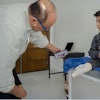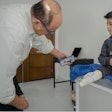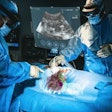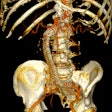
Huge budget deficits used to be the norm at the University Medical Center Eppendorf (UKE) in Hamburg, Germany, but the award-winning care provider is back on track. The center's IT strategy has contributed significantly to improving its financial situation and boosting the quality of care and patient safety -- but only due to prior streamlining of processes.
With approximately 1,400 beds, UKE is the largest among the city's hospitals. Each year, the hospital treats around 50,000 inpatients, 250,000 outpatients, and 50,000 emergency patients. Back in 2004, it had become obvious to UKE's decision-makers that a turnaround was absolutely necessary: Processes had to be made much more effective to help the hospital survive. Managers opted to restructure the organization, re-engineer processes, and modernize buildings, explained Dr. Peter Gocke, the outgoing chief information officer (CIO).
 Process optimization has to precede IT implementation: UKE's outgoing CIO Dr. Peter Gocke.
Process optimization has to precede IT implementation: UKE's outgoing CIO Dr. Peter Gocke.
UKE's management realized that the role of IT had to be that of an enabler; prior to considerations regarding IT tools, homework needed to be done. First, an analysis of the situation was carried out, and key aspects requiring modification were identified. As a second step, the project team developed process guidelines that made an interdisciplinary medical center out of UKE, outlined by Henning Schneider, Gocke's successor as CIO. Subsequent to process modifications and building activities, IT solutions were implemented. UKE decided in favor of Soarian in particular because of its flexibility, Schneider explained. The Web-based system was easily adapted to the data security regulations and user roles.
Within just three years, UKE implemented a hospital-wide IT system based on Soarian Clinicals and Soarian Health Archive from Siemens Healthcare. Allowing for a campus-wide holistic view of a patient’s relevant clinical data, including previous reports, Soarian Clinicals covers medical and nursing documentation, as well as electronic order entry, for all UKE departments. The solution helps coordinate individual tasks, synchronize handoffs, and facilitate communication. Soarian supports pathways defined by the hospital, and allows staff to manage each step along the way, including completion of process steps and monitoring of deviations from process guidelines. Adaptations to the individual patient's care plan can be carried out.
 Henning Schneider, the new CIO, will further extend the IT strategy.
Henning Schneider, the new CIO, will further extend the IT strategy.
Soarian Health Archive is an archiving and document management platform. Its orientation toward standards such as HL7, FTP, DICOM, and XML makes it interoperable with numerous hospital IT systems such as PACS. It provides a view of patient data and archiving functionality for further information in various formats.
Today, the system is in use in all UKE departments, and acceptance is very high, according to Schneider. The electronic patient record provides the basis for managing the entire continuum of care; there are no more paper records. The implementation includes a real-time dashboard in the emergency room and the large laboratory that handles around 7 million specimens annually. Benefits deriving from the accessibility of information anywhere and anytime, such as the reduction of errors and increased flexibility in the organization, become even more obvious in times of crisis, and even research and teaching departments profit from the availability of data, which are pseudonymized or anonymized for these purposes.
Last year, HIMSS Analytics Europe recognized UKE for achieving stage 7 of the organization's Electronic Medical Record Adoption Model (EMRAM). This methodology for evaluating the progress and impact of EMR systems tracks the progress of hospitals in eight completion stages (0-7). UKE is the first hospital in Europe to achieve the top rating on that EMR adoption scale, awarded for achieving a paperless medical record environment. Sharing data with external partners, based on this system, is the next challenge UKE will be tackling; Soarian Integrated Care will provide the basis for an appropriate solution.



















